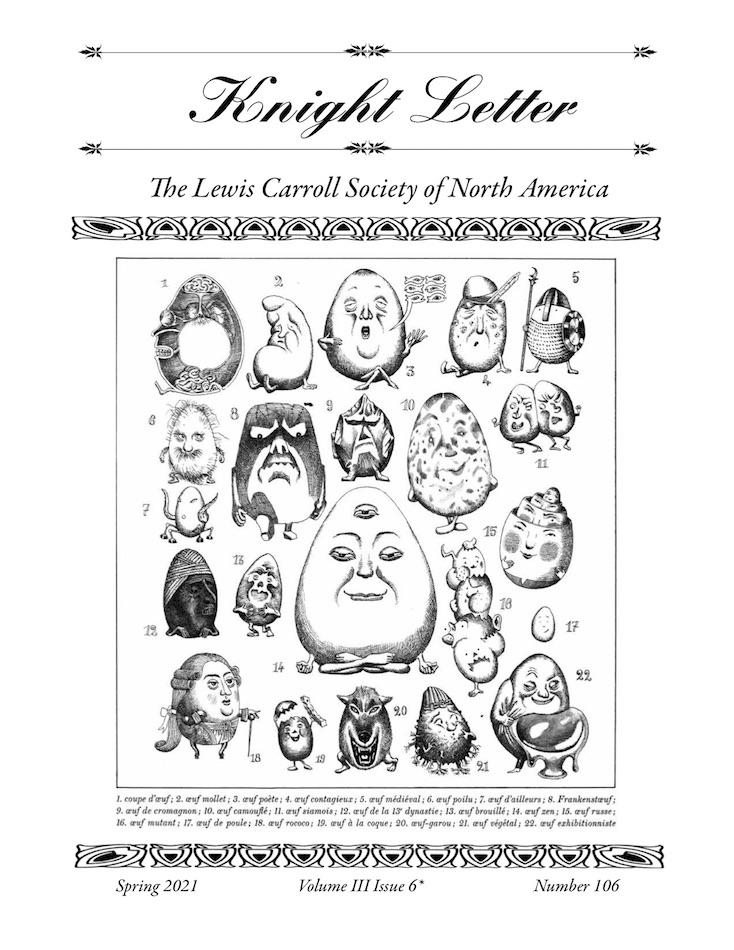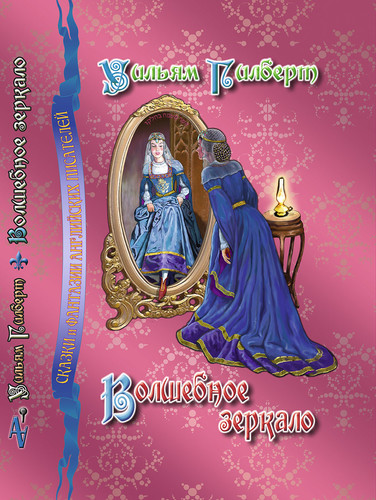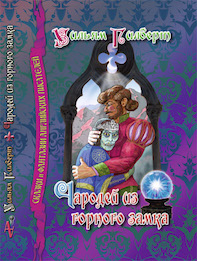No Mock Turtle in a Mock Translation
© 2021 Dmitry Yermolovich
 [This is Dmitry Yermolovich's part (full version) of his joint review with Andrew Ogus of the edition:
[This is Dmitry Yermolovich's part (full version) of his joint review with Andrew Ogus of the edition:Л. Кэрролл. Алиса в Стране Чудес / Illustrated by 13 artists
Gorbushin, 2020; ISBN 978-5-6044757-0-6
Knight Letter: the official magazine of the Lewis Carroll Society of North America. —
Annandale (VA): Spring 2021. Vol. V, issue 1, No. 106.]
Click on the image to the left to download the pdf version of the review as published in the magazine.
The author of the new (2020) Russian version of Alice’s Adventures in Wonderland (AAIW), Oleg Gorbushin, is a book illustrator not known to have done any translation work before. So the first questions that come to the reviewer’s mind are: why translate a world-famous classic anew? and what does one hope to achieve — without being a language specialist, let alone a professional translator?
This is what I found on the edition’s website:
“The modernism of the writer and the complexity of the [book’s] language inevitably leads the translator to become a modernist and approach the text of the tale not from the position of semantic accuracy, but the accuracy of the method or model used by the author.
In this Alice project, the text is aimed primarily at the reader of the twenty-first century: the tale is easy, free, fluent and quick to read, and is linked to the Russian (rather than English) linguistic tradition and to widely known examples of Russian culture. That is, the modernist model of Lewis Carroll himself and the translation model of Vladimir Nabokov are taken as the literary model of the text. The reader thus has the opportunity to feel and understand the interaction of the author’s ideas and language with the set-in cultural milieu that the readers themselves are filled with.
In addition, the translation claims to span “seven levels of communication.” The explanation of that is rather obscure, but the reference to Nabokov gives me a clue. Simply put, Gorbushin’s Alice is another “Russianized” translation: the Victorian poems parodied by Carroll are replaced with samples of Russian literature.
There is a significant difference, however: Nabokov populated his version of Wonderland with Russian characters (turning Alice into Anya, in the first place), which makes their readings from Russian poets perfectly natural. Mr. Gorbushin’s characters still remain English and in a Victorian setting. That they recite parodies of Pushkin’s Eugene Onegin and poems by Mayakovsky (a Soviet avant-garde poet of the 1920s) is quite out of place and time. Instead of his “Evening Soup,” the Mock Turtle (or, more precisely, his weird modification I’ll describe later) sings a twisted version of the 1952 Soviet song “Suburban Moscow Nights.” This “modernist” repertoire crosses all limits of Carrollian nonsense and lapses into absurdity, a point I will return to.
Poetry aside, let’s turn to the prose. Why not just look at how plain narrative sentences are translated? This is where the translator’s method should be best revealed. Is the new Russian version of AAIW as “easy, free, fluent and quick to read” as we are told? Alas, not even close to that.
What strikes the reader’s eye is the abundance of dashes. Not only do they outnumber all other punctuation marks: they break sentences into short disconnected fragments, as if pronounced in a stutter. Thus, Carroll’s phrase —
…the Queen merely remarking that a moment’s delay would cost them their lives —
is translated:
Королева — только появившись — вскользь — но громко — обмолвилась, — что — если они все не начнут играть быстрее, — поплатятся — она всем прикажет отрубить голову.
[In back translation (BT): The Queen — as soon as appearing — in passing — but loudly — let it slip — that — unless all of them started to play faster — they’d pay — she’d have everyone’s head off.]
Such “multiple fractures” are not isolated, they run through the entire Russian text. Here is another example, one also indicating what happens with the puns and jokes in the translation:
“Now, I give you fair warning,” shouted the Queen, stamping on the ground as she spoke; “either you or your head must be off, and that in about half no time! Take your choice!”
— Выбирай, — сказала Королева, скрестив на груди руки, — что хочешь — мгновенно исчезнуть с головой — или — чуть позже — исчезнуть без головы.
[BT: “Choose,” said the Queen, folding her arms, “what you want — to disappear instantly with your head — or — a little later — to disappear without your head.”]
True, “in about half no time” is a difficult play on words to translate, but “disappear without your head”? How is that supposed to be funny?
In a similar context —
The Queen’s argument was that, if something wasn’t done about it in less than no time, she’d have everybody executed, all round —
the translator apparently thought that the pun could be conveyed with multiple repetitions of the same word, and wrote:
Королева кричала, что никто не выполняет её приказов и что если «сию! сию! сию! сию! сию минуту!» кто-нибудь что-нибудь не сделает, то она прикажет казнить всех.
[BT] The Queen shouted that nobody was following her orders and that if someone didn’t do something “this! this! this! this! this minute!”, she’d have everybody executed.
All I can gather from this wording is that the Queen was probably panting. But there is little humor in that, if at all.
All other characters in the new Russian version of AAIW pant as well, as the sentence-breaking dashes indicate. Here’s what Gryphon’s remark —
“This here young lady, she wants for to know your history, she do” —
sounds like in translation, apparently in line with the ‘21st-century-oriented method’:
— Эта юная леди, — начал Грифон, — хочет - вынь да положь — услышать про твою жизнь. Зачем — непонятно, интерес — комедия. Но — хочет. Привел её по приказу Королевы.
[BT] “This young lady — wants — here and instantly — to hear about your life. Why — no idea, her interest — a comedy. But — she does. Brought her by order of the Queen.”
You must have noticed that quite a few things have been added by the translator to the original message (“here and instantly”, “why — no idea”, “her interest — a comedy, etc.) One may call it ‘modernistic,’ but the more common Russian name for this is otsebyatina — a word coined by Mr. Gorbushin’s colleague, 19th-century artist Karl Bryullov, which translates approximately as “stuff off the top of one’s head” or, in some contexts, “padding.” The whole book is strewn with such unwarranted and incongruous additions. Here is another sample (with the “padding” set in bold):
…the King and the executioner ran wildly up and down, looking for it [the Cat].
Король и палач ещё долго бегали по площадке — туда — сюда — взад — вперёд — слева — направо — справа — налево — туда и обратно — разыскивая осуждённого…
[BT: The King and the executioner ran still a long time about the ground — up — down — backwards — forward — from left — to right — from right — to left — there and back — looking for the sentenced one.]
That said, the “padding” goes hand in hand with omissions and distortions. In the above example, the expressive modifier “wildly” has been replaced with “a long time.” At other places, where Alice just “whispers” something, her Russian counterpart whispers it “acrimoniously” (ехидно). When asking Alice for her name, the Russian Queen of Hearts demands, for some reason, to know the child’s “title” (really?). Two simple spices named by Alice — vinegar and chamomile — have been turned into three exotic dishes: couscous, goulash, and tarator (also known as tzatziki). The Queen’s soldiers, rather than “walking two and two,” as Carroll had them, form an “equilateral square of three by three, preceded by their commander." Talking of the royal procession, “cupids in white tunics” and “cavaliers” have been added to the crowd. How do these characters fit into a pack of cards?
On the other hand, many of Carroll’s descriptions have been dropped from the translation entirely. I found the Queen of Hearts, for example, stripped of some of her most vivid characteristics. In the Russian version, she no longer “tosses her head impatiently”, “glares like a wild beast”, “stamps on the ground,” speaks “severely” or “in a voice of thunder.” Gone is the famous remark: “The Queen had only one way of settling all difficulties, great or small.”
I could go on and on with the list of distortions, omissions and pieces of “padding.” Among the latter quite a number are apparently meant to be jokes. See for yourselves if they make you laugh:
Я запрещу все острые блюда, чтобы не уколоться.
[BT: I’d prohibit all piquant dishes, so nobody could prick themselves.]
…от бульона — булькают, а от таратора — тараторят.
[BT: Broth makes people bubble, and tarator makes them babble.]
А в голове Алисы тихо шептались между собой мысли.
[BT: Thoughts in Alice’s head whispered quietly among themselves.]
Герцогиня перепутала и дала Королеве вместо веера оплеуху.
[BT: The Duchess mixed things up and gave the Queen a box on the ear instead of a fan.]
And what has happened with the aphorisms and sayings found in AAIW? Again, see for yourselves:
The more there is of mine, the less there is of yours.
Не копай яму другому — станешь копушей.
[BT: Don’t dig a hole for another, you’ll become a dawdler.]
Birds of a feather flock together.
У каждой птицы свои сестрицы.
[BT: Every bird has its sisters.]
Take care of the sense, and the sounds will take care of themselves.
Не связывай себя словами, а связывай мнением о словах.
[BT: Don’t bind yourself with words, but bind with an opinion of words.]
(In case you didn’t guess: none of the above translations make sense or evoke any meaningful associations in Russian.)
As far as puns and jokes are concerned, Chapter 9 is one of the most indicative, so let’s take the part where Alice is told why the whiting is so called — it “does the boots and shoes”, remember? I will not reproduce the English original text in full because Gorbushin’s version leaves nothing of it, but replaces it with a totally different narrative. Here it is, with a few comments of mine added in brackets:
Сардины очень музыкальны Это утверждал и Сэр Дина.
— А кто это?
— Первый мореплакатель Сэрдинского моря, — сказал Грифон. — Это он подарил сардинам своё
имя, потому что любил, как они поют.
— Рыбы поют? Я думала, что они всегда молчат, — сказала Алиса.
— Рыбы всякие нужны, рыбы всякие важны, — ухмыльнулся Грифон.
[BT] “…Sardines are very musical. Sir Dine used to say that.” [“Sir Dine” is a play on “sardine,” but it works as poorly in Russian as it does in English; no “sir Dine” figures anywhere in literature or folklore.]
“Who is he?”
“The first sea-weeper of the Sirdine Sea. [This must be intended as a jocular distortion of “Sardinia Sea,” though there is no such sea on any modern maps and I’m afraid very few Russian readers would get the hint. “Sea-weeper” (moreplakatel) is a meaningless invented word, a distortion of “seafarer” (moreplavatel).] He gave the sardines his own name because he loved the way they sing. [The context suggests no reason, humorous or not, why fish should be imagined singing and how their singing is related to “Sir Dine”.]
“Do fish sing? I thought they were always silent,” said Alice.
“Fish of all kinds are needed, fish of all kinds are important,” Gryphon smiled. [The remark parodies the lines “All mothers are needed, all mothers are important” from the poem What Have You Got? (1935) by Sergei Mikhalkov, a children’s writer and the author of the Soviet anthem. Again, no logical link whatever between “sardines singing” and the wise proclamation that “fish of all kinds are needed”.]
The passage you have read should give you an idea of the translator’s ‘method’ of dealing with Carroll’s puns and jokes.
I have promised to return to the difference between literary nonsense and absurdity. The former consists in the deconstruction and unconventional reassembly of the meanings of words and phrases; the resulting nonsense is weird, but has a logic of its own, and this is what makes it funny and witty. The emergence of the Mock Turtle from “mock turtle soup” is the epitome of the trick.
The translation under review is based not on deconstruction, but on the destruction of all sense and meaning, leading to sheer absurdity. Again, this is illustrated graphically by the way Mr. Gorbushin introduces his version of the Mock Turtle, compared with the original:
“Have you seen the Mock Turtle yet?”
“No,” said Alice. “I don’t even know what a Mock Turtle is.”
“It’s the thing Mock Turtle Soup is made from,” said the Queen.
“I never saw one, or heard of one,” said Alice.
— А ты встречалась с морской Квазизвездой?
— Нет, никогда. Я не знаю, кто это.
— Ты никогда не ела звёздный суп?
— Нет, даже не пробовала.
[BT: “Have you met with the Quasi-Starfish?
“No, never, I don’t know who that is.”
“You haven’t eaten star soup?”
“No, not even tasted.”]
If you think the Russian text contains an implicit joke, pun, allusion or whatever, you are grossly mistaken. What “star soup” is, and why the “Starfish” has the prefix Quasi-, is anybody’s guess. It isn’t nonsense, it’s the lack of all and any sense. The nonsense of the original is delightfully witty, the absurdity of the translation is depressingly obtuse.
But there is a problem which makes it worse. As you read the text further, you realize that the translator does have a hidden agenda — and one which has nothing to do with Carroll or, worse even, with what is believed to be appropriate children’s reading.
As you have guessed by now, the Mock Turtle has become Quasi-Starfish, a female. (This explains, among other things, — in case you were wondering — what the images of starfish represent in the book.) Now, this is how the Queen mentions her the first time in the Russian text (notice the part set in bold):
Проводи эту юную леди к квазизвезде. Пусть она послушает, как та звездит о своей звёздной жизни.
[BT: Take this young lady to the Quasi-Starfish. Let the girl look at the cunning stunt as she blabs about her life of stardom.]
This back translation should give you an approximate, but close enough, idea of how the text sounds to the Russian ear. The verb zvesdit (here, ‘blabs’), like many other derivatives of zvezda ‘star,’ is actually a see-through euphemism for a very dirty word, classified as so-called mat, or prophane language. Mat is officially banned in the media and (mostly) in print, so euphemistic rhymes are used by some speakers and authors to circumvent the ban. It is much like saying “what the fudge…” or “abso-fudging-lutely” in English, but the effect such language produces in Russian is only slightly less abusive than plain mat.
Mr. Gorbushin really lets himself go with derivatives of zvezda, the transparent veil of a rhyming dirty word, strewing the text abundantly with them (including the untranslatables zazvesdit’, zvezdanutyi). But are they really worth discussing in detail? After being brought to this ‘level of communication,’ I felt I had reached the reasonable limit in analyzing this style of translation exercises.
There is just one last thing that remains for me to say: I believe I can trace the origin of the Quasi-Starfish. It’s a thing Mock Translation Soup is made with. But not only with that. It’s a mishmash of broken sentences, misplaced references, arbitrary omissions, insipid distortions, additions off the top of one’s head, pathetic jokes and sordid double entendres intended to be spicy, but predictably unsavory.


